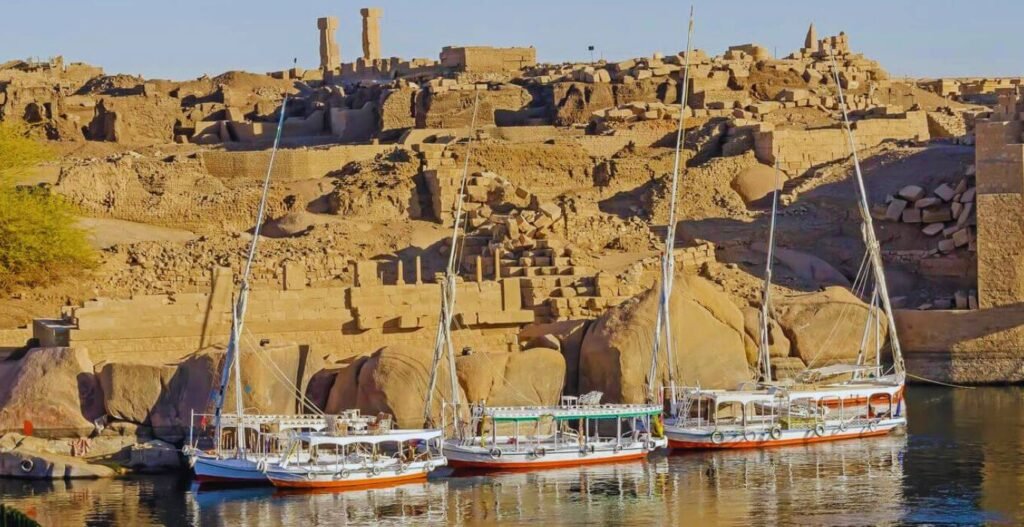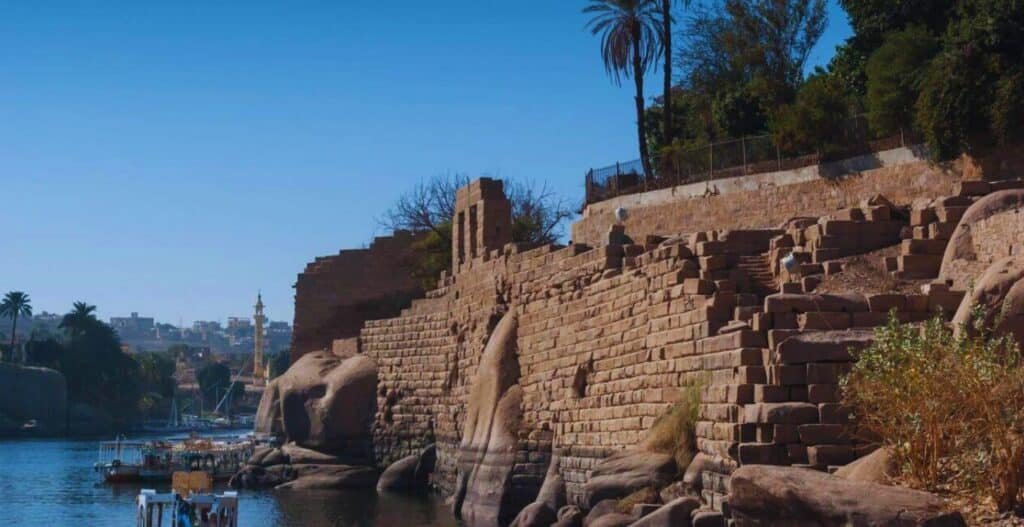Elephantine Island, nestled amidst the Nile and overlooking the picturesque city of Aswan in Upper Egypt, is a charming and must-visit destination for tourists.
This small island has served as the focal point of Aswan for centuries, boasting a rich history that dates back to 3000 BC. Inhabited for millennia, Elephantine Island is an enduring symbol of Aswan and holds significant cultural and historical importance.
Visiting Elephantine Island is essential for travelers exploring Egypt, offering a captivating glimpse into the region’s ancient past and serving as an iconic representation of Aswan’s heritage and allure.

Elephantine Island in Aswan
Despite the absence of actual large animals like elephants on the island, the peculiar name of Elephantine Island is not linked to the presence of such creatures, contrary to initial assumptions.
One prevailing theory regarding the origin of the island’s name suggests that it stems from the appearance of gray granite rocks situated to the south. These rocks resemble a gathering of elephants, thus potentially giving rise to the name “Elephantine.”
Another belief regarding the island’s nomenclature is rooted in its shape, which some assert resembles an elephant’s tusk. These diverse explanations contribute to the mystery surrounding the island’s name, despite the absence of elephants in its vicinity.
The tourist value of the island and its location
During the era of the pharaohs, the location now known as Aswan was situated on a land strip called Swenet. This trading town strategically safeguarded itself from enemy attacks by cleverly positioning itself away from the river’s swift currents.
Swenet was a pivotal trading hub due to its proximity to a waterfall. Caravans from the southern regions would offload their merchandise in the Swenet before further transportation towards the northern areas.
Despite its modest size, Elephantine Island offers a wealth of attractions and activities that visit beautiful Aswan, an experience not to be missed. The area’s historical significance and cultural richness make it an enticing destination for travelers.
Temples of Elephantine Island
The historical sites of Elephantine Island once housed the temples of Thutmose III and Amenhotep III. Unfortunately, these structures met their demise when Muhammad Ali assumed control of Egypt and enforced the Islamic faith across its territories.
The earliest temple constructed on the island was the Satet Temple, dating back to around 3000 BC. Throughout three millennia, this temple underwent various renovations and modifications.
Records document the presence of the Egyptian Temple of Khnum from the Third Dynasty, and it underwent a complete reconstruction during the Thirtieth Dynasty in Egypt, preceding the Greco-Roman era. This reconstruction marked a significant period of refurbishment for the temple on Elephantine Island.

Nilometer on Elephantine Island
The Nilometer on Elephantine Island stands as a significant attraction for tourists. Initially constructed to gauge the levels and clarity of the Nile River’s waters during the annual flood season, it holds historical importance.
Elephantine Island houses two prominent measures of the Nile, the most renowned being the Nilometer linked to the Temple of Satis. This particular Nilometer is among the oldest in Egypt, showcasing the ancient methods employed to monitor and assess the river’s fluctuations, crucial for agricultural planning and understanding the Nile’s yearly inundation cycle.
Aswan Museum
The Aswan Museum, situated on the southeastern side of Elephantine Island in Aswan, is a prominent tourist destination. Since its inception in 1912, the museum has been a repository for numerous artifacts that narrate the history of the Nubian region.
In 1990, an additional section of the museum was inaugurated, focusing on exhibits unearthed from the confines of Elephantine Island itself. This collection encompasses various items, including ceramics, mummies, weaponry, and various utensils.
Many of these invaluable objects were discovered by the German Archaeological Institute, contributing significantly to the museum’s inventory. Notable among these discoveries are the mummified ram of Khnum, a deity revered in ancient Egyptian mythology, and a rare artifact known as the Elephantine Calendar of Things from the reign of Thutmose III. These artifacts shed light on the historical and cultural significance of the region, offering visitors a deeper understanding of the area’s rich heritage.
Jewish presence
Records show the presence of a Jewish community residing on Elephantine Island circa the 5th century BC. They constructed and upheld a temple where they made offerings to multiple deities, adhering to a polytheistic belief system.
Beginning an Egypt Nile cruises is a once-in-a-lifetime experience that will bring you old wonders, beautiful scenery, and a look into the country’s long and interesting past. One of the highlights of an Egypt Nile cruise is the opportunity to explore the Nile river tourist attractions.

